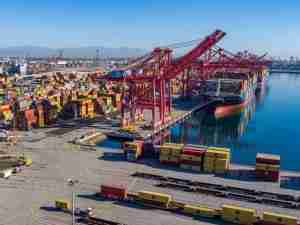Study determines deeper Mississippi River would add $11.5 billion to US economy
posted by AJOT | Aug 23 2013 at 11:38 AM | Ports & Terminals
U.S. Senator David Vitter, the ranking member of the U.S. Senate Committee on Environment and Public Works, joined industry and Louisiana transportation officials for the release of a new economic impact report detailing the benefits of deepening the Mississippi River to 50 feet from its current 45-foot draft.
The Big River Coalition and the Louisiana Department of Transportation and Development commissioned the study by noted economist Tim Ryan, PhD., entitled “The Economic Impact of Deepening the Mississippi River to 50 Feet.” Ryan determined a deeper channel allowing for larger vessels to maximize cargo throughput would create $11.49 billion in increased U.S. production, generate 16,991 new permanent jobs and account for $849.5 million in increased income for American workers.
“It’s extremely important that our Nation’s ports and waterways can meet current and future transportation needs,” Sen. Vitter said. “The water resources bill that we passed through the Senate earlier this year will give us the opportunity to increase funding to dredge and improve our waterways and infrastructure – a huge benefit for Louisiana. But more needs to be done, and this report will be a big step forward.”
The Lower Mississippi River channel was originally authorized to be deepened to 55 feet in the Water Resources Development Act (WRDA) of 1986; however, the channel was never deepened below 45 feet due to the onerous requirement by the federal government that annual maintenance beyond 45 feet is the responsibility of the local sponsor, or the State of Louisiana in this case. Recent language passed by the Senate in the latest WRDA bill would shift maintenance costs up to 50-foot drafts to the federal level. Industry leaders and the Big River Coalition agreed upon a reduced draft from 55 feet to 50 feet to match the controlling draft of the new locks on the Panama Canal, expected to be completed in 2015.
The plan to deepen the Lower Mississippi River would be accomplished in two phases. Phase one would deepen Southwest Pass to Venice, La., or Mile 10 above Head of Passes – a 30-mile stretch of River. The first phase would automatically open 175 miles of River to a 50-foot channel, due to the River’s naturally deep channel. Estimates are Phase I’s construction costs would be $195 million with annual maintenance costs of $60 million. Phase II would begin at Belmont Crossing and dredge several River crossings to Mile 232 at the Baton Rouge Harbor at a cost of $105 million, with annual maintenance costs of $30 million.
The economy of the United States is dependent upon the Mississippi River for both the inbound movement of raw materials critical to manufacturing, as well as the outbound movement of goods produced in the United States bound for global markets,” said Gary LaGrange, President and CEO of the Port of New Orleans. “For domestic growers, producers and manufacturers to remain competitive, our nation’s maritime highways must be of critical importance to the federal government.”
Sean Duffy, Executive Director of the Big River Coalition, contends the deepening project makes sound economic sense and also offers a chance to immediately build thousands of acres of wetlands to aid coastal restoration efforts.
“If the Mississippi River is not deepened to match the controlling draft of the new Panama Canal locks, U.S. exporters become less competitive in the world market and consumers pay more for goods and services,” Duffy said. “The cargo carried on the River has an estimated $135 billion annual impact on the nation’s economy. We are talking about a River that connects 31 states and two Canadian Provinces through the third largest river basin in the world. It is a true maritime superhighway. The time to bring the Mississippi River channel and its infrastructure into the future is now.”









